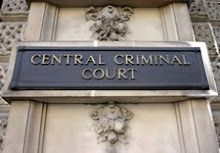Former judge attacks 'cosy club' of barristers who get the best work
By Robert Verkaik, Legal Affairs Correspondent
Thursday, 23 November 2000 INDEPENDENT online
A "near monopoly" of a dozen or so barristers who have the pick of heavy prosecution work at the Old Bailey is "unhealthy" and should be broken up, a retired judge has told the Government.
The 100-year-old restrictive practice, in which just a select band of lawyers share in the biggest fees paid out for prosecuting the most serious crimes, is criticised in a report by His Honour Gerald Butler QC.
In some cases, said the former judge, senior Treasury Counsel earn substantially more than the judges in front of whom they appear.
This would be an "understandable anomaly", says the report, if the barrister was privately funded, but where both the judge and the barrister are publicly funded it was "less comprehensible".
Last year the Crown Prosecution Service paid out £79m in legal aid fees to barristers who prosecute in the Crown Courts, a substantial part of which went to Treasury Counsel.
Gerald Butler's report, presented this week to Lord Williams of Mostyn, the Attorney General, calls for an end to the domination of this work, which includes murder and manslaughter trials, by barristers from London chambers.
The five senior Treasury Counsel come from just three sets of chambers, and all 11 Treasury Counsel are based in London.
The report says this "indiscriminate approach", with few barristers working "long unsocial hours", may be the reason why only one woman has been appointed Treasury Counsel.
Although none of the Treasury Counsel are QCs the post is regarded as a stepping-stone to taking Silk.
The former judge, who was a respected member of the Bench at Southwark Crown Court, said that in the past this select band of barristers had been a "cosy little club" where membership was perceived to be determined by nepotism and "incestuous networking".
As long ago as 1978, there were calls for the abolition of the post of Treasury Counsel because of the "excessively close relationship" between the Treasury barristers and the Bench.
Gerald Butler said that although this was not the case now, and reforms had been put in place that had led to more work going to other chambers, there was room for improvement.
He said there was "widespread support" among the judiciary and the Bar in favour of retaining the system but he had encountered "reservations" and criticisms".
The former judge recommends that the Crown Prosecution Service should now consider instructing barristers from outside London instead of relying solely on Treasury Counsel.
He also said that the practice of paying junior Treasury Counsel two-thirds of the fee paid to senior Treasury Counsel, irrespective of the seriousness of the case, should be replaced with a fairer one.
Women lawyers and lawyers from ethnic minorities should also be encouraged to apply for Treasury work, he said.
The fees earned by Treasury Counsel are considerably less than defence barristers' earnings who are paid as much as two-thirds more in legal aid.
But this is set to change next month when Lord Irvine of Lairg, the Lord Chancellor, introduces a new graduated fee scheme for criminal and family barristers paid out of the public purse.
When this happens it is anticipated that prosecution work will become much more attractive to defence barristers.
In 1998 Lord Irvine published names of the highest-paid criminal barristers - all of them specialised in defence work.
Lord Williams said yesterday he would be accepting the "bulk of the recommendations without modification".
He added: "The keystone reform will be to encourage applications from a broader range cross-section of the Bar (and solicitor advocates). There will also be a higher quality of monitoring so that able barristers will have the best chance of an appointment."

No comments:
Post a Comment